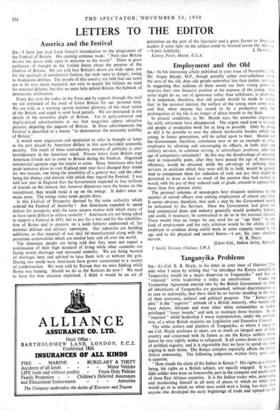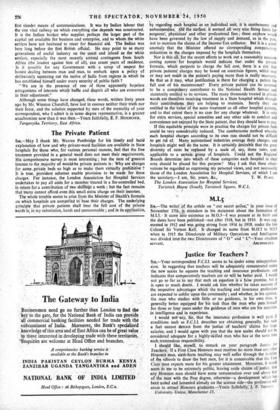Tanganyika Problems
SIR,—Lt.-Col. E. B. Hoyle, in his letter in your issue of October 27th, asks what I mean by writing that "to introduce the Kenya complex to Tanganyika would be a major disservice to Tanganyika" and that an " imposed " white leadership is today an anachronism. Under the Trusteeship Agreement entered into by the British Government in 1946, all inhabitants of Tanganyika are guaranteed, without discrimination as to race or nationality, that there shall be no barrier standing in the way of their economic, cultural and political progress. The "Kenya com- plex" is the " superior " attitude of a British minority, who would still treat Asians, Africans and even other white nationalities as under- privileged "lesser breeds," and seek to maintain those barriers. By an " imposed " whiti'leadership I mean representation, under the constitu- tion, of a white British majority on Legislative and Executive Council. The white settlers and planters of Tanganyika, at whom I regret to see Col. Hoyle professes to sneer, are as much an integral part of their country and concerned with its future as are the Kenya settlers whose future he very rightly wishes to safeguard. It all comes down to a mattei of political sagacity, and it is regrettable that we have to spend our time arguing in such terms. The Kenya complex especially affects the Ken)a Indian community. The following judgement, written forty years ago, is apposite. "How stands the claim of the Indian in Kenya ? His rights as a human being, his rights as a British subject, are equally engaged. It was the Sikh soldier who bore an honourable part in the conquest and pacification of these East African countries. It is the Indian trader who, penetrating and maintaining himself in all sorts of places to which no white man would go or in which no white man could earn-a living, has more than anyone else developed the early beginnings of trade and opened ua the
first slender means of communications. It was by Indian labour that the one vital railway on which everything else depends was constructed. It is the Indian banker who supplies perhaps the larger part of the capital yet available for business and enterprise, and to whom the white settlers have not hesitated to recur for financial aid. The Indian was here long before the first British official. He may point to as many generations of useful industry on the coast and inland as the white settlers, especially the most recently arrived contingents from South Africa (the loudest against him of all), can count years of residence. Is it possible for any Government with a scrap of respect for honest dealing between man and man, to embark upon a policy of deliberately squeezing out the native of India from regions in which he has established himself under every security of public faith ?
"We are in the presence of one of those apparently hopeless antagonisms of interests which baffle and dispirit all who are concerned in their adjustment."
Although some things have changed, these words, written forty years ago by Mr. Winston Churchill, have lost in essence neither their truth nor their force, and the solution supported by men of the mentality of your correspondent, who I admit is in some degree representative, is a greater anachronism now than it was then.—Yours faithfully, E. F. Hrroicocx.
Tanganyika Territory, East Africa.















































































 Previous page
Previous page